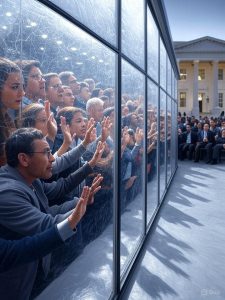Vacuum double glazing is celebrated for its ability to create a perfectly sealed environment, transparent, efficient, and protected from external heat or cold. This cutting-edge window technology removes air between two panes of glass, preventing thermal transfer and enhancing insulation. For more information about vacuum double glazing, click here to visit the Vacuum Glass website.
But while it works wonders in architecture, this design offers a cautionary metaphor when applied to politics: What happens when power becomes just as insulated, sealed off from public input, yet appearing transparent?
The Illusion of Visibility
 At first glance, vacuum-insulated glass looks no different from any other window. You can see straight through it. But the vacuum layer blocks energy from moving freely; no matter how hot or cold it is outside, the inside remains largely unaffected.
At first glance, vacuum-insulated glass looks no different from any other window. You can see straight through it. But the vacuum layer blocks energy from moving freely; no matter how hot or cold it is outside, the inside remains largely unaffected.
Political systems can work the same way. Institutions might appear open, holding press briefings, publishing reports, and maintaining websites, yet operate within a controlled vacuum. Outsiders can see the performance, but they can’t influence the system meaningfully. This is transparency without access, a see-through pane that keeps the people out.
Insulation as Stability or Suppression
Vacuum glazing is prized for maintaining indoor stability. It keeps rooms comfortable, energy-efficient, and less susceptible to climate fluctuations. That sounds good. But in politics, too much insulation creates a dangerous imbalance.
Power that is insulated from external pressure may appear stable, but it becomes unresponsive. Think of legislative bodies where decision-making happens behind closed doors, or regulatory agencies captured by corporate interests. These systems become so shielded from public opinion that they eventually lose the ability—or willingness—to adapt.
Just as a building sealed too tightly might trap stale air or harmful gases, a political system that seals itself off from its citizens can trap corruption, elitism, and complacency.
Pressure Builds in a Vacuum
One reason vacuum glass must be manufactured with extreme precision is that pressure imbalances can cause it to shatter. A similar rule applies to politics. When citizens are locked out, when feedback, protest, or dissent are muffled, the result is pressure without release.
Eventually, this leads to social rupture. Revolutions, uprisings, and systemic collapses often begin in environments where people can see power but cannot touch it. The system may look efficient from the outside, but inside, it’s fragile, brittle from a lack of accountability.
Controlled Clarity Isn’t Democracy
Vacuum double glazing is a technological marvel, but it’s not designed for participation; it’s meant to shield, not share. When political systems mirror this architecture, they risk becoming echo chambers. Policies are drafted within elite circles. Citizens are offered summaries instead of choices. Elections become rituals, not real shifts in power.
Transparency doesn’t just mean publishing data or holding press conferences. It means allowing actual influence, giving people the tools, access, and power to participate meaningfully in the process. Societies have long built symbolic barriers and controlled access in different cultures, and modern governance can unintentionally replicate those same boundaries, even when it claims to be open. Without genuine participation, political clarity becomes little more than optical transparency in a vacuum-sealed system.
Rethinking the Role of Pressure
There’s value in insulation, but only if balanced. In building design, proper airflow matters. In politics, so does pressure. Public criticism, civic protests, and media watchdogs are the equivalent of ventilation, ensuring that systems remain fresh, adaptive, and alive.
A well-designed political system doesn’t block out all external forces; it adapts to them, learns from them, and integrates them. That’s how real transparency works, not as a sealed unit, but as a responsive, porous, living structure.
Conclusion: Break the Seal, Not the Glass
Vacuum double glazing is brilliant for energy savings and climate control, but as a metaphor for governance, it raises an important warning: Don’t confuse visibility with access. A political system that looks open but acts sealed is not truly democratic.
To build healthy societies, we must ensure that power is not just on display; it must be reachable, challengeable, and accountable. Otherwise, we end up staring at a clear pane of progress that’s impossible to touch.

